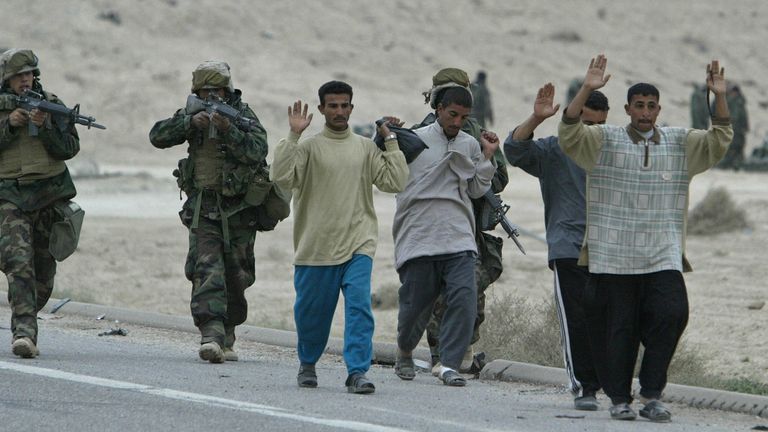The 2003 United States invasion of Iraq had many significant political effects on the middle eastern region. Although this invasion was justified by the United States when it occurred, there have been many questions since as to how beneficial it truly was. The war has cost countless lives of American troops and Iraqi citizens, and has created an unstable Iraqi government.
Prior to 2003, the United States had aims in ending the rule of Iraq’s leader Saddam Hussein, and putting a stop to rumored weapons of mass destruction (WMD). The opening stages of the war was led by a coalition of United States and British troops, who were able to overwhelm Iraqi forces and overtake Baghdad. The United States hit Iraq with a series of airstrikes to take them out early. These attacks cause Saddam Hussein and many other government officials to flee. The United States Ambassador Paul Bremer became in charge of the government in the time of the transition away from Saddam Hussein. During his time, Bremer dissolved the military which led to 350,000 soldiers to be without a job. The beginning of the war in Iraq set a stage for the Iraqi citizens to have a justifiable hatred for the United States. By bringing a war to them and causing chaos in their home it made sense that many Iraqi citizens did not align with the United States. In December 2003, the United States was able to capture Saddam Hussein, leading to him being tried and hanged in 2006. Quickly following his capture, in January of 2004 the United States announced that they were unsuccessful in finding the weapons of mass destruction. Many United States citizens supported the idea of finding and removing these weapons, however once it was made known that these weapons were not real the United States government began to lose support from its citizens.
Following the first year of the United States invasion and occupation in Iraq, there were many counts of attacks by terrorist groups. Which led to a continuous spiral of United States military intervention across the country and attacks by Iraqi citizens on not just U.S. troops but other citizens. There were attacks on new political parties, such as the KDP and PUK party. The United States responded to these attacks with more force, such as the Battle of Fallujah. The United States had a goal to take out insurgents groups and put an end to attacks in the region, but is seemed like the more action they took the harsher the reaction.
The United States invasion of Iraq may have had good intentions, but both sides were negatively affected. Justification for the invasion came through finding alleged weapons of mass destruction controlled by Saddam Hussein compounded with the rumored ties to Al- Qaeda. Both of these things together could have led to dangerous outcomes. Putting an end to Saddam Hussein is viewed as a positive aspect, however the actions the United States took to get there and in following was a recipe for disaster. There was an unavoidable tension between both the United States and Iraqi citizens. The hostility of both of these groups led to battles between the two. Some Iraqi citizens, including former Iraqi soldiers who were relieved from duty following the dissolution of their government joined regimes and terrorist groups. This led to a series of ongoing conflicts between Iraq and the United States.
There were also many regional effects of the United States invasion. After the dissolution of the Iraqi government, the United States fought to implement democracy in the country. Their target was to let a democratic Iraq lead the implementation of democracy throughout the middle east. Non-democratic countries in the region that had relations with the United States such as Egypt and Saudi Arabia were not cooperating and did not agree with the plans. Also, the decline in power of Iraq helped shape the power dynamic in the middle east (Gause, 2010). Currently, both the countries Saudi Arabia and Iran have been able to maintain power in the region both economically and politically. Iraq was not only a powerful nation, but one that did not get along with either of these countries. Iran and Saudi Arabia were able to take advantage and grab power.
The U.S. invasion of Iraq had a multitude of effects not just within Iraq, but in the middle eastern region. The aftermath of these effects can still be seen today.


Leave a Reply